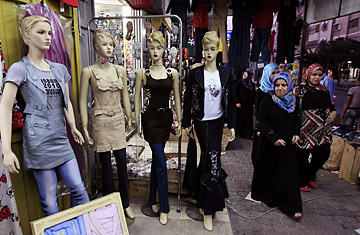
Palestinian women walk past shops in Gaza City
Earlier this week at Gaza City police headquarters, Hamas police officials sat behind a pile of marijuana, cocaine, alcohol and painkillers, and proclaimed their success in battling the infiltration of illegal substances.
"We have cracked down completely on the major drug traffickers," declared police chief Brigadier General Abu Obeida Al-Jarah. Drug traffickers would be hanged, police officials warned before the contraband was publicly burned.
Some observers saw the display as a superficial bid for credibility by an increasingly unpopular regime. Four years after Hamas won a decisive election victory over the U.S.-backed Fatah movement — and three years after it drove out the armed forces of its rival in a brutal battle for control of the streets — Gaza struggles under the weight of a grinding Israeli blockade. Much of its infrastructure has yet to be reconstructed following Hamas' last military clash with the Israelis 18 months ago, and popular discontent is growing. Hamas' own grip on power depends on it playing a delicate balancing game between appeasing its more militant supporters and avoiding antagonizing the wider citizenry.
"We know there is a time for when you can tolerate and [a time] when you can put more restrictions. And this all depends on what the people want," says Ahmed Yousef, Hamas' Deputy Minister of Foreign Affairs and a close adviser to Prime Minister Ismail Haniya. "We have to read public opinion and respect public opinion. When we tolerate too much, open it too much, a lot of criticism comes to us — from the Salafists [extreme Islamists who share al-Qaeda's outlook], even from Hamas. And if you tolerate too much, you agitate the whole society against you." Conversely, he adds, cracking down too hard "will lead to extremism."
The police explain last month's decrees banning women's clothing stores from having dressing rooms or displaying revealing clothing in their windows, and the ban on women smoking shisha (flavored tobacco) in beachfront cafés as bowing to popular demand. "This is to protect the conservative values of Gaza. By doing this, we have met the people's wishes," says Mahmoud al-Haj Ali, a police spokesman, adding that the authorities polled public opinion on those issues. "We received complaints from some people that women are being harassed inside the shops. And we have found that some people are not satisfied with the revealing clothes shown in the storefronts," he explains. "What concerns us most is people's comfort."
But many Gazans, even some conservatives, did not welcome the decrees. "Our culture doesn't accept that sort of thing," says Najaa el-Masry, a mother of six, of women smoking shisha. But her husband, a civil servant of the previous Fatah-run government, adds: "It's not Hamas' right to tell people whether they can or cannot smoke shisha."
Still, the new rules don't appear to be rigorously enforced. Some women are still seen smoking shisha in cafés, men still wear shorts on the beach and storefronts in Gaza City's upmarket Rimal neighborhood still feature strappy, backless dresses in their windows.
Gaza is, of course, relatively socially conservative — there weren't many women smoking shisha to begin with. Last year's ban on women riding on the backs of motorcycles was greeted with shrugs because few Gazans could remember ever seeing a woman on a motorcycle. But Hamas' critics say these decrees — and attempts to require women lawyers to wear headscarves in court or to ban men from working as women's hairdressers — are desperate attempts to appease the group's more militant members, while their lax enforcement reflects a simultaneous desire to appease the wider community.
The real motivation for Hamas to appease its more radical elements is their potential to launch attacks on Israel in defiance of the movement's 18-month cease-fire, which could jeopardize Hamas' efforts to win mainstream acceptance abroad.
"We are Erdogan, not Taliban," Yousef tells TIME, referring to Turkey's populist Prime Minister Recep Tayyip Erdogan. Simultaneously, he argues that women smoking shisha destroys their beautiful image and is therefore inappropriate. "We are well-educated. We are not against elections or a peaceful rotation of power or pluralism — all these things. We are not against women or education. We are not against the West. We would like to bridge the gap between East and West."
Hamas' commitment to political pluralism is questioned by a filmmaker who declines to be named for fear of retribution. "Talking with Ramallah [Fatah's seat of power] is a crime," he says. "You can be sentenced to 20 years, and they call it collaborating with Ramallah. They deal with you in the same way they deal with collaborating with Israel."
Some wonder if the Islamist movement known for shooting its opponents in the kneecaps is really capable of the democratic governance espoused by Yousef. "Before they took control of the Strip, thousands came out when they called for a demonstration," the filmmaker says. "Now only their members go. People have started to know Hamas as real. And Hamas knows this is one of their biggest problems: how to regain the support of the people."
— With reporting by Rami Almeghari / Gaza City
